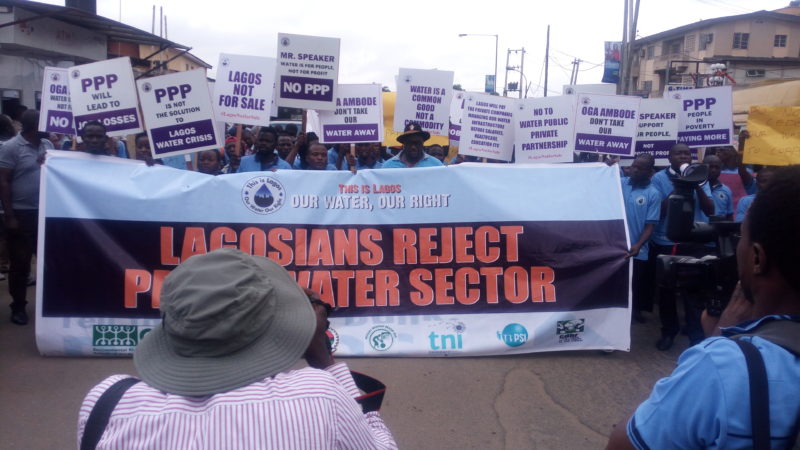Though the new Lagos Environment Law was signed into law by Governor Akinwunmi Ambode some three weeks ago, Lagosians only decided to challenge it through a street protest on Wednesday, March 22 2017, to mark the World Water Day (WWD).

World Water Day, observed on March 22 every year, is about taking action to tackle the water crisis all over the world.
From Ikeja Local Government Secretariat, near Computer Village, to Alausa, the seat of power, thousands of protesters marched peacefully accompanied by four vans laden with police personnel.
In their sky blue customised T-shirts, the protesters wielded different placards condemning the privatisation of water in Lagos.
The event was made possible by coalition of civil society groups, including Environmental Rights Action/Friends of the Earth Nigeria (ERA/FoEN), Committee for the Defence of Human Rights (CDHR), Joint Action Front (JAF), Africa Women Water Sanitation and Hygiene Network, and Child Health Organisation.
Others are Climate Aid, Centre for Dignity, and Amalgamated Union of Public Corporations, Civil Service, Technical Recreational Services Employees (AUPCTRE).
In a statement presented to Governor Ambode at Alausa, the organisers acknowledged the administration’s “giant strides in the delivery of democracy dividends to the citizens of Lagos State in various sectors”. Hence they declared their readiness to support the administration in achieving its set goals, “which will in the long run make life meaningful for all the citizens of the state”.
However, they reiterated their concern on the government’s plan to secure universal access to water through privatisation of Lagos water infrastructure.
“As we have mentioned in our earlier communication on this same issue, evidence abounds showing that countries that have experimented the public private partnership (PPP) model of water privatisation burnt their fingers,” they stated.
But the Lagos State Commissioner for Environment, Dr. Babatunde Adejare, argued that every developed country in the world is operating on the PPP model in water distribution.
While addressing the supporters at the House of Assembly gate where armed police erected a barricade to ward off the protesters, the commissioner said government’s intention is for the good of Lagosians.
On a sarcastic note, leaders of the protest said PPP means “Public money in Private Pockets”.
The statement, signed by Akinbode Oluwafemi of ERA/FoEN, Achike Chude of JAF, Oluwatosin Kolawole of Climate Aid, Alex Omotehinse of CDHR, Veronica Nwanya, Vicky Urenma among others, reads in part: “The models upon which the PPP is based has failed to uphold the human right to water and has locked governments into long term contracts. Such deals have proven exceedingly difficult for cities to exit, despite rate hikes, service cut-offs and unfulfilled infrastructure promises, and they prevent cities from making crucial progress towards real solutions to water access challenges.
“Your Excellency, Lagos does not need to experience social conflicts or drown in debt to steer clear of this slippery road fraught with booby traps.”
An attempt to open the doors wide for privatisation through legislation, according to them, was the injection of anti-people sections in the initial draft of the newly signed “Laws relating to the Environment for the Management, Protection and Sustainable Development of the Environment in Lagos State and for Connected Purposes”.
“Criminalising the drilling of boreholes and setting fines and prison terms for people who go out of their way to obtain a free gift of nature are practices that only remind us of the long-gone military era. It is on this premise that we are, again using this medium, asking you to reject water PPP projects in the management of Lagos water infrastructure,” they added.
They asked the governor, among other things, to:
- remove all the remaining provisions in the new Lagos Environmental Law that opens the doors for privatisation in the form of PPP or any other
- institute Water Trust Fund that will expand public financing of the water sector
- reject contracts designed by or involving the International Finance Corporation (IFC), which operates to maximise private profit, and
- build the political will to prioritise water for the people by investing in the water infrastructure necessary to provide universal water access.
When the government officials, accompanied by men of the SSS, approached the protesters, there were shouts of “We want to see our governor”, “When Ambode wanted our votes, he came to us, we want to see him now”, “This is the way they had been treating us everytime we come here”. But all these fell on deaf ears, as the commissioner eventually addressed the crowd
